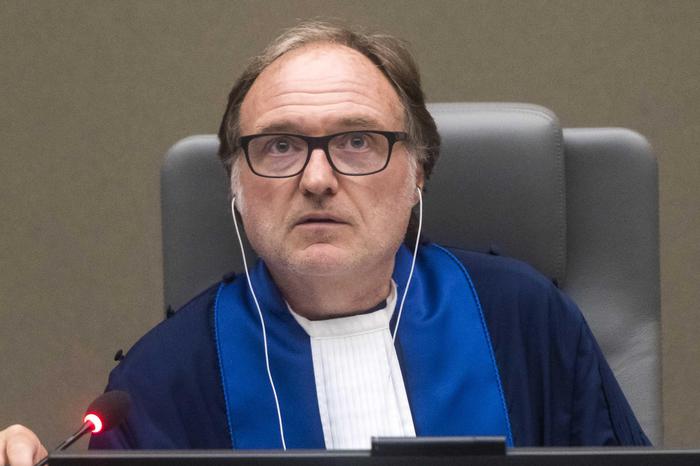Alejandro Gertz Manero, Attorney General of the Republic, during a press conference in 2019. Moisés Pablo (CUARTOSCURO)
After almost seven years, the Gertz case finally reaches port, wrapped in layers of controversy and suspicions of influence peddling, which have made it one of the most talked about issues in recent years in Mexico.
Confronted with his political family for the death of his brother, the attorney general, Alejandro Gertz, faces this last phase of the process weakened, already in the hands of the country's highest court.
This Monday, the Supreme Court of Justice of the Nation (SCJN) decides on the case.
Entangled in disputes with once powerful figures, such as Julio Scherer or Santiago Nieto, the prosecutor barely has the support of the president, Andrés Manuel López Obrador.
Spied on his own phone, questioned, increasingly questioned, a ruling against him would leave the prosecutor in a difficult position, in view of the time and effort he has dedicated to this and other personal matters.
The Mexico City prosecutor's office and its judicial apparatus, both supporters of the prosecutor's postulates, would also remain in a strange place.
EL PAÍS analyzes the keys to the case.
the vote
Monday's court session seems almost like a formality at this point.
Last week, the highest court published the draft sentences presented by Minister Alfredo Gutiérrez, which agree with the prosecutor's family and would release his niece-in-law, Alejandra Cuevas, imprisoned since October 2020, from prison. The prosecutor accuses Cuevas and his mother, Laura Morán, Federico Gertz's partner for decades, of improperly caring for him in his old age, causing his death in 2015.
Some of the ministers have already shown themselves in favor of the political family of Gertz.
Drawn by the SCJN in November, the ministers discussed the case for the first time a few weeks ago.
Another minister then presented a different draft sentence, rejected by the majority, who asked to get to the bottom of the matter and not stay in the formalities of the appeals that had come to court.
That request, seconded by the minister president, Arturo Zaldívar, was understood as favorable to Cuevas and Morán.
Minister Gutiérrez's new project thus points to the bottom of the matter, the last weeks of August 2015, when Federico Gertz fell ill and Cuevas and Morán would have avoided taking care of him, according to the prosecutor.
Morán has always denied any type of omission.
The woman is 96 years old.
The Mexico City prosecutors who investigated the case filed it on two occasions.
The capital's investigative agency only reactivated it with Alejandro Gertz at the head of the Attorney General's Office (FGR), a position he has held since January 2019.
Minister Gutiérrez's text criticizes the last stage of the investigation by the Mexico City prosecutor's office, but above all points to the judge who sent Cuevas to prison and ordered Morán's arrest in October 2020. “The resolution that orders the arrest of Laura Morán does not meet the requirement according to which the interference in the freedoms of people is only justified in cases of last resort”, reads the document.
Later he focuses on the background, the murder accusation.
And she says: “This Full Court considers that the death of Federico Gertz cannot be attributed to Mrs. Morán, because given her own conditions, she was not required to take care of him herself.
(...) According to her possibilities, she provided him with attention and care and trusted that the caregivers, nurses and doctors would neutralize the danger to which he was exposed”.
If they vote in favor of the project, Cuevas would be released and the order to arrest Morán would disappear.
Alive in theory, the investigation of the Mexico City Prosecutor's Office would be mortally wounded, only pending the shelving, unless new evidence is presented.
August 2015
Federico Gertz and Laura Morán never married.
They lived together for more than three decades and had no children, but she had three from a previous marriage.
In an interview with EL PAÍS a few months ago, Morán assured that she had never had problems with Federico, less with her brother Alejandro, with whom they maintained, she said, a cordial but distant relationship.
At 82 years old, Federico Gertz was a dependent man with the beginning of dementia.
He had progressively lost the vision in his right eye due to herpes and had a pacemaker.
Given the situation, a caretaker had been helping him at home since the beginning of August 2015. In his statement before the capital's prosecutor's office, Morán explained that his partner claimed to see non-existent things more and more frequently.
In the statement, Morán says that on the morning of August 4, 2015, Federico fell at home and hit his head.
That same day, he left with his brother Alejandro.
Morán says that Alejandro saw that his brother was in good condition.
The next day, Morán took Federico Gertz to the doctor.
The doctor prescribed risperidone, a tranquilizer designated for patients with schizophrenia.
The drug hit the old man, completely sedated.
Morán says that on August 8 they took him to another doctor, who prescribed another medication, quetiapine, an antipsychotic also indicated for people with schizophrenia.
Federico Gertz continued with this medication for 10 days.
It was not until later that another doctor detected the patient's dementia and stopped the previous treatments.
By then, Federico Gertz was already living on the ground floor of the house, not in his room, and he enjoyed 24-hour care from a nursing service.
Sometime between the third and fourth week of August, he came down with pneumonia.
His condition worsened.
On August 24, Morán contacted Alejandro Gertz to tell him, according to the prosecutor, that his brother was "in very poor health, in agony."
Alejandro Gertz went to his brother's house and sent several doctors.
That's where the breakup started.
According to the doctors sent by the future prosecutor, Federico Gertz was poorly cared for.
He had sores on his back, was dehydrated and was drowning in his own phlegm from pneumonia.
Then there was a tug of war.
According to Gertz, Morán and his daughters were determined to prevent the terminally ill patient from suffering, even ripping out a catheter that had been installed to supply him with medication.
According to Morán, they took the best care of him, helped by the doctors, until Gertz broke into his house with agents from the Mexico City prosecutor's office to take the patient to the hospital on August 29.
Federico Gertz died in the medical center a month later, the product of "generalized visceral congestion" caused by pneumonia and a heart attack.
The question now and then is why.
What reasons would the couple have for decades of a man to want his death, already at the end.
Gertz has never explained why, although in her first complaint she asked that the National Banking and Securities Commission be asked to freeze Federico's bank and securities accounts until the investigation was resolved.
The process and the controversies
The entry on the scene of the Mexico City Prosecutor's Office changed everything.
Alejandro Gertz denounced Morán and her daughters, Alejandra and her sister, Laura, for attempted murder due to neglect of care.
He obtained the intervention of experts from the investigating agency and the transfer of his brother to the hospital.
Upon his death, Gertz upgraded the complaint to homicide.
The investigators began the investigation, but over the next two years they archived it at least twice, actions that Gertz always answered with resources and protection.
In July 2020, with Gertz already at the head of the FGR, the case turned around.
Unlike what had been done in previous years, the Mexico City prosecutor's office brought the investigations before the judge, requesting the arrest of Laura Morán and only one of her two daughters, Alejandra Cuevas.
On October 2, the judge agreed and ordered her arrest.
For some reason, the prosecution only arrested her daughter on October 16, leaving Morán free.
On October 19, the judge sent Cuevas to prison.
In the middle of last year, EL PAÍS reported that just around that time, a strange process of crossed accusations, undercover negotiations and secretly recorded conversations was intertwined with the legal battle.
According to the children of Alejandra Cuevas, the prosecutor had asked them through intermediaries for a check for 3.5 million pesos, money that Morán had withdrawn in August 2015 from the accounts he had with Federico Gertz.
The return of the money, in addition to other valuables and works of art that Gertz understood belonged to his family's estate, implied, according to them, that the process against his mother and his grandmother would end.
And, ultimately, that Cuevas, already in prison, recover his freedom.
Asked about it, Gertz denied to this newspaper the existence of any negotiation, although he avoided denying the collection of the 3.5 million pesos, the reception of the works of art or the use of intermediaries to obtain them.
"The relationships that I have for the money, which is reparation for the damage, are the business of Mrs. Laura Morán and mine," said the prosecutor.
In October of last year, this newspaper also interviewed the prosecutors who had been in charge of the investigations during the first years of the investigation and who twice decided to file them.
Reported by Gertz for denial of service, they criticized that they felt persecuted and that they had done the work without any pressure.
As in the case of the death of Federico Gertz, the investigation here hardly moved until Gertz's arrival at the FGR, when the Mexico City prosecutor's office requested the arrest of the prosecutor in charge, his boss and his secretary.
“We lost our job and we had to hide,” said Jorge Vélez, the prosecutor in charge of the case.
In the main case, both Cuevas and Morán appealed the judge's orders to arrest them and, in the case of Cuevas, to lock her up in jail.
In February 2021, a local court confirmed this.
The women then went to federal justice, which agreed with them in September.
Gertz and the Mexico City prosecutor's office appealed and a higher court should be in charge of resolving the case, when, in November, when it had already become a regular issue in the media, the SCJN brought the matter.
subscribe here
to the
newsletter
of EL PAÍS México and receive all the informative keys of the current affairs of this country
Exclusive content for subscribers
read without limits
subscribe
I'm already a subscriber















